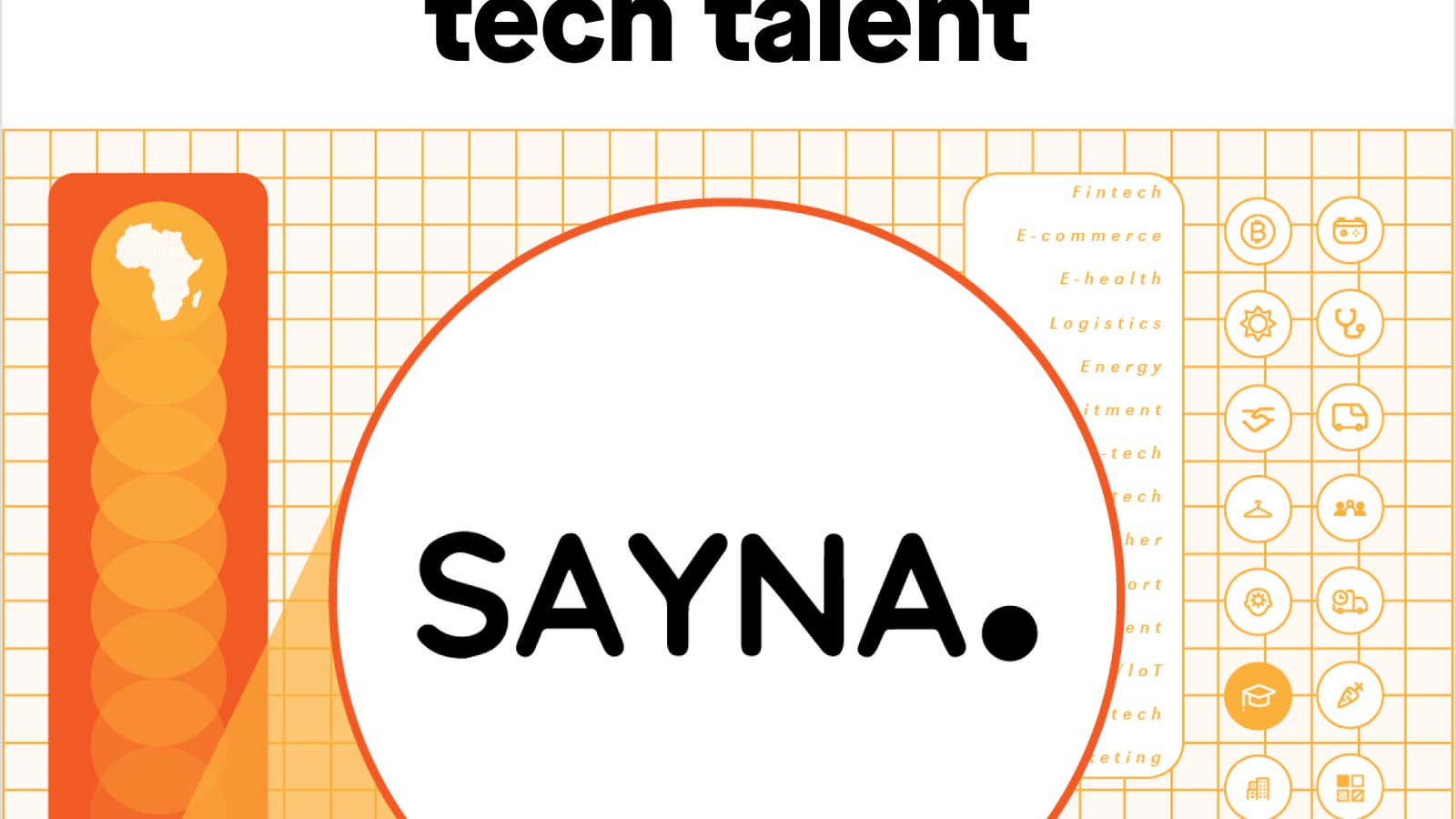Hi Quartz Africa members,
As Africa’s tech ecosystem grows, the demand for talent is soaring. For young Africans, digital skills have become ever-more important, and attractive.
In 2021, according to the Africa Developer Ecosystem Report (pdf), Africa’s developer community grew by 3.8%, bringing the total number of developers on the continent to 716,000. The average local developer in Africa is seven years younger than their global counterpart and has up to three years of experience.
Compensation for software developers rose by an average of 11% in 2021, highlighting the increasingly lucrative opportunities available to tech talent in Africa. While startups generally hire junior developers and offer valuable on-the-job training, developers working for international companies make 1.4 times the monthly income when compared to those working for local companies.
The pandemic drove an increased adoption of remote work around the world, leading to international companies recruiting African developers at record rates. For example, OfferZen, the South African job platform for remote developers, has reported record levels (pdf) of hiring activity, surpassing pre-pandemic levels.
Besides developers, tech opportunities have sprung up for other professionals with ancillary skills such as research, design, SEO, product management, and marketing.
A combination of these factors has made digital skills education necessary across Africa. Tech talent plays a key role in attracting funding, as shown by the fact that 81% of venture capital funding in Africa (pdf) in 2021 went to the top four countries with the highest population of software developers: Nigeria, South Africa, Egypt, and Kenya.
Several startups across Africa are working to equip young Africans with digital skills, and also to open up various work opportunities to their students.
Cheat Sheet
💡 The opportunity: There is a fast-growing demand for African tech talent, but a lack of relevant skills training and access to opportunities creates an entry barrier.
🤔 The challenge: Infrastructural challenges, including lack of consistent power and fast internet, combined with a lack of tools such as computers and smartphones, make it harder for many Africans to access digital skills training.
🗺 The road map: To increase access to digital skills training, innovators need to develop affordable, accessible solutions that equip learners with relevant knowledge and skills they need to thrive in the job market.
💰 The stakeholders: Startups, governments, and companies must work together to increase access to digital skills training and connect developers to opportunities in the job market.
By The Digits
81%: The share of venture capital funding in Africa in 2021 that went to the top four countries with the highest population of developers: Nigeria, South Africa, Egypt and Kenya.
7: The number of years by which the average African developer is younger than their global counterpart
716,000: The number of developers in Africa in 2021
3.8%: The year-on-year growth in the number of developers in Africa in 2021
11%: The increase in compensation for software developers in Africa in 2021, compared to the previous year
The Case Study
Startup: Sayna
Sector: Edtech
HQ: Antananarivo, Madagascar
Matina Razafimahefa moved to France from her home country of Madagascar at the age of 15. It struck her how affordable education was in France. Public schools are free, and the state subsidizes most private schools making fees more affordable for parents.
Asking herself why education in Madagascar couldn’t be similarly affordable and accessible was a lightbulb moment in her edtech journey.
In 2018, having raised €5,000 ($5,107), she went back to Madagascar to set up the first iteration of the edtech startup that was to become Sayna. It was a physical learning program focused on imparting digital skills to young people and connecting organizations to talent that could solve IT micro-tasks.
Sayna had just received a new delivery of chairs and desks when authorities in Madagascar announced the closure of all learning institutions due to covid-19. The pandemic forced Razafimahefa to rethink the startup’s model entirely.
In the shift to a digital space, Sanya split into two: Sayna Academy and Sayna Work. On Sayna Academy, learners get subscription-based access to modules on everything from backend and frontend development, UI/UX design, and SEO. It costs €9.90 ($10.11) per month. Sayna features original educational resources including video and audio lessons, and webinars. Students also work together and engage through an active online community.
Sayna Work offers organizations the chance to tap into Sayna’s talent pool, pairing a job post with relevant talent. So far, Sayna has trained over 450 students and worked with organizations such as the World Bank and Orange Madagascar.
Sayna is now expanding to other African countries, including Côte d’Ivoire, Cameroon, and Algeria.In 2021, Sayna received funding from I&P Acceleration Technologies, a program focused on African digital startups led by an investment fund, Investisseurs & Partenaires (I&P). In 2022, it raised $600,000 from Orange Ventures, Launch Africa Ventures, and MAIC Investors Club to further develop its platform.
Sayna expects to launch the newest version of its technology—a mobile video game and a revamped Sayna Work platform—in September 2022. “We have 1500 people in line for beta testing,” Razafimahefa tells Quartz.
Gamifying learning is expected to offer learners a more interactive, engaging experience that equips them with important digital skills. The service will first be made available in Madagascar and the rest of Africa, but Sayna aims to make it accessible globally.
In conversation with

🎮 On the decision to develop a mobile video game:
It is a decision we made as a team, because of the needs of our students. They should be able to follow learning anywhere, even on the bus.
👩🏽💻 On Sayna students’ employment rate:
Ninety percent of students who have finished the courses have found jobs. Our clients have included the World Bank and Orange Madagascar, Axian, Access Bank, and ASEC.
🌏 On launching their mobile video game internationally:
We want to launch the mobile video game in Madagascar and the rest of Africa and then France and the rest of Europe. We realized that the desire to learn these skills isn’t limited to Africa.
Edtech deals to 👀
Tunisian edtech startup GOMYCODE raised $8 million in June 2022 to expand across Africa. It offers over 30 learning tracks, including web development, digital marketing, data science, and artificial intelligence.
Nigerian edtech startup AltSchool Africa raised a $1 million pre-seed funding round in February 2022. It aims to equip Africans with in-demand tech and employability skills to help them launch their careers.
uLesson, an Africa-focused edtech startup, in December 2021, announced that it had closed a $15 million Series B round. Its all-encompassing edtech includes videos, live classes, quizzes, and homework.
More from Quartz Africa
💪 Big tech is winning the battle for Kenya’s talent
🖼️ Nairobi’s “silicon savannah” just got more attractive
🦸🏽 Kenyan YouTube show focuses on STEAM education
This member brief was prepared while listening to Eazy, an album by Scar Mkadinali.
Have a productive week!
—Martin Siele, Nairobi-based Quartz contributor
One 📱 Thing
African developers have strong programming experience in both web and mobile. One in two developers (pdf) builds apps for Android. Mobile devices are the biggest drivers of Internet access on the continent. In Sub-Saharan Africa, mobile internet users are projected to grow from 303 million in 2020, 28% of the population, to 474 million (39% of the population), by 2025.
